How Much Caffeine is in Sweet Tea
Shop our Pu Erh Tea collections!
When you sip on a glass of sweet tea, you're consuming caffeine. The caffeine content varies depending on the type of tea leaves used and the brewing time. Typically, black tea is used for making sweet tea, which naturally contains more caffeine compared to green tea.
Here's how the caffeine in sweet tea might look:
Bestsellers
- Standard 8-ounce serving: 10-80 milligrams of caffeine
- Home-brewed sweet tea: 10-70 milligrams per 8 ounces
- Commercial sweet tea brands: 5-40 milligrams per 8 ounces
Remember, the longer you steep the tea, the more caffeine you'll extract. This means a strong, densely brewed sweet tea will have more caffeine than a lightly steeped one. Also, if you're sensitive to caffeine, consider limiting the amount you drink or opting for decaffeinated tea leaves.
Note: Decaffeinated versions of sweet tea are available, but even these contain trace amounts of caffeine, typically 1-5 milligrams per 8 ounces.
It's also worth mentioning that the addition of sugar doesn't affect the caffeine content; it only impacts the sweetness and calorie count of your beverage. However, it's the caffeine that contributes to the energy boost and potential increase in alertness after drinking sweet tea, not the sugar.
Remember these points when choosing your next glass of sweet tea and how it fits into your daily caffeine intake for the best experience.
Discover our best-selling raw Pu Erh tea and elevate your tea experience today!
Average Caffeine Content by Sweet Tea Brands
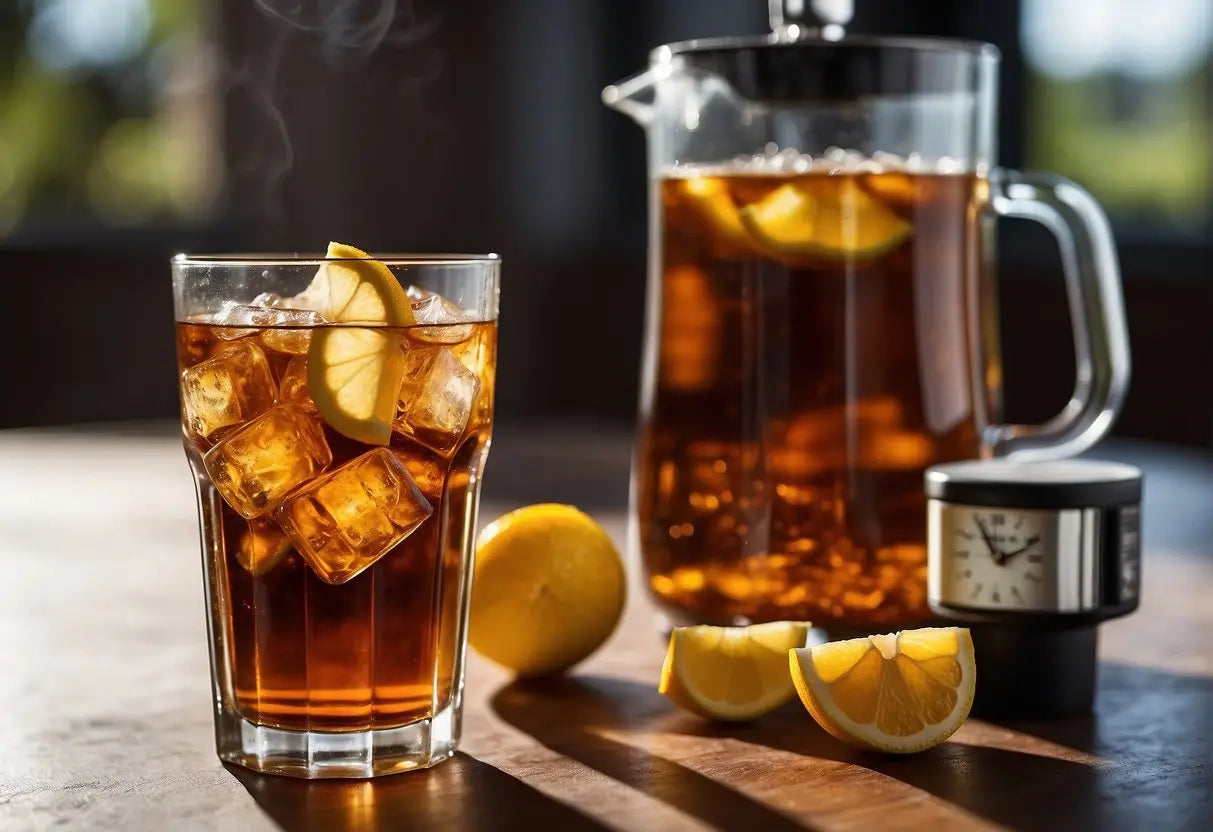
When looking to understand the caffeine content in sweet tea, it's important to consider the specific brands as the amounts can vary. Below is a breakdown of some common sweet tea brands and their average caffeine content.
| Brand | Caffeine Content (per 8 fl oz) |
|---|---|
| Gold Peak Sweet Tea | 15 mg |
| Pure Leaf Sweet Tea | 30 mg |
| Arizona Sweet Tea | <15 mg |
| Lipton Sweet Tea | 20 mg |
| Sweet Leaf Sweet Tea | 30 mg |
For those of you monitoring your caffeine intake, Gold Peak Sweet Tea and Arizona Sweet Tea are on the lower end of the spectrum. Conversely, Pure Leaf Sweet Tea and Sweet Leaf Sweet Tea contain higher caffeine levels which could provide that extra boost of energy you might be seeking with sweet tea.
It's crucial to note that the sizes of servings may affect your total caffeine consumption. For instance, a 16 fl oz serving will double the amounts listed in the table. To help manage your caffeine intake, check the labels of these and any other sweet tea brands for the most accurate information. Remember, individual sensitivity to caffeine varies, so it's wise to adjust your consumption according to your personal tolerance.
Comparison with Other Caffeinated Beverages
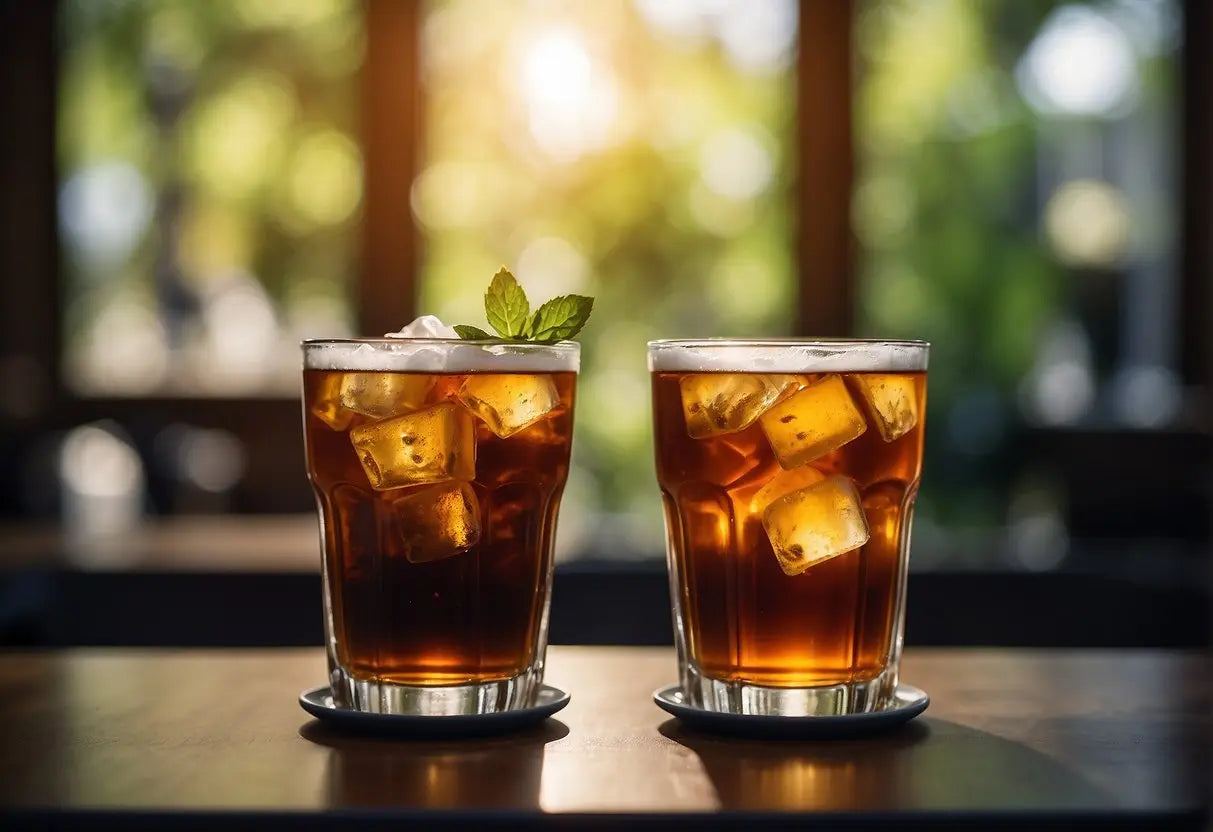
When you're considering the caffeine content in sweet tea, it's helpful to examine how it stacks up against other popular caffeinated drinks. Typically, an 8-ounce (237 ml) serving of sweet tea contains about 15 to 30 milligrams of caffeine, but this can vary depending on preparation methods and tea variety.
Coffees:
Lao Ban Zhang
- Brewed Coffee: 95-200 mg per 8 oz
- Espresso: 63 mg per 1 oz
- Instant Coffee: 30-90 mg per 8 oz
Teas:
- Black Tea: 40-70 mg per 8 oz
- Green Tea: 25-45 mg per 8 oz
- Herbal Tea: 0 mg per 8 oz (caffeine-free)
Soft Drinks:
- Cola: 20-40 mg per 8 oz
- Energy Drinks: 50-160 mg per 8 oz
Comparison Table:
| Beverage | Caffeine Content (per 8 oz) |
|---|---|
| Sweet Tea | 15-30 mg |
| Brewed Coffee | 95-200 mg |
| Espresso (per 1 oz) | 63 mg |
| Instant Coffee | 30-90 mg |
| Black Tea | 40-70 mg |
| Green Tea | 25-45 mg |
| Herbal Tea | 0 mg |
| Cola | 20-40 mg |
| Energy Drinks | 50-160 mg |
In comparison, your sweet tea typically has less caffeine than brewed coffee, espresso, and even some energy drinks. However, it can contain more caffeine than most colas and certain brands of green tea. It is comparable to black tea but varies widely. Herbal teas are caffeine-free and provide a different option for those looking to reduce their caffeine intake.
Factors Affecting Caffeine Levels in Sweet Tea
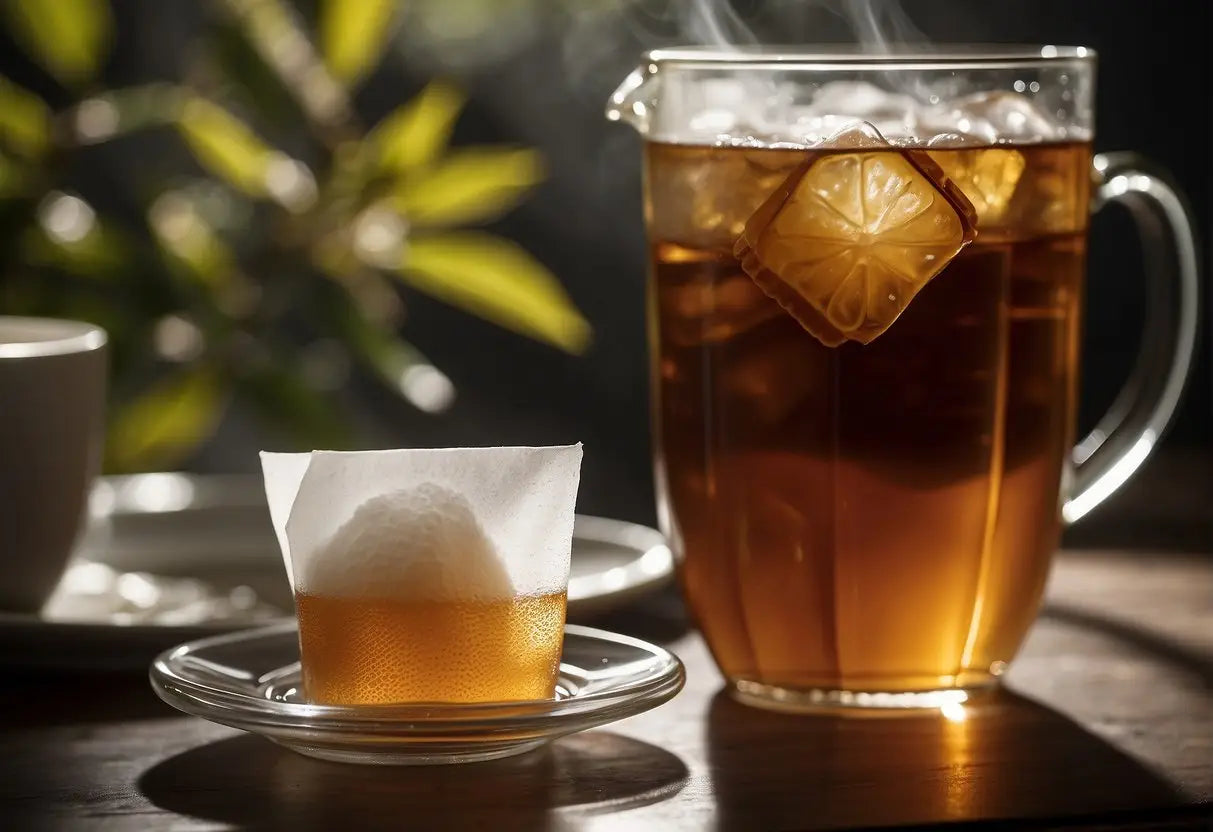
When gauging the caffeine content in your sweet tea, consider the following key factors:
Type of Tea Leaves: The variety of tea leaves used is the foundational determinant of caffeine levels. Black tea leaves, commonly employed for sweet tea, typically contain more caffeine than green or white teas.
Brew Time: The duration for which the tea leaves are steeped impacts caffeine extraction. A longer brew time usually means more caffeine in your sweet tea.
Water Temperature: Hotter water extracts caffeine more effectively. Therefore, brewing with boiling water increases the caffeine content compared to using warm or cooler water.
Amount of Tea Leaves: The quantity of tea leaves per cup directly influences caffeine levels. More leaves lead to a higher caffeine concentration.
Tea Leaf Cut: Finely cut tea leaves have a larger surface area exposed to water, which can enhance caffeine release compared to whole leaves.
Sweetness Level: While the amount of sugar does not affect caffeine, a sweeter taste may mask the perception of caffeine’s strength.
Use this information to tailor your sweet tea experience to your preferred caffeine intake.
Health Implications of Caffeine in Sweet Tea
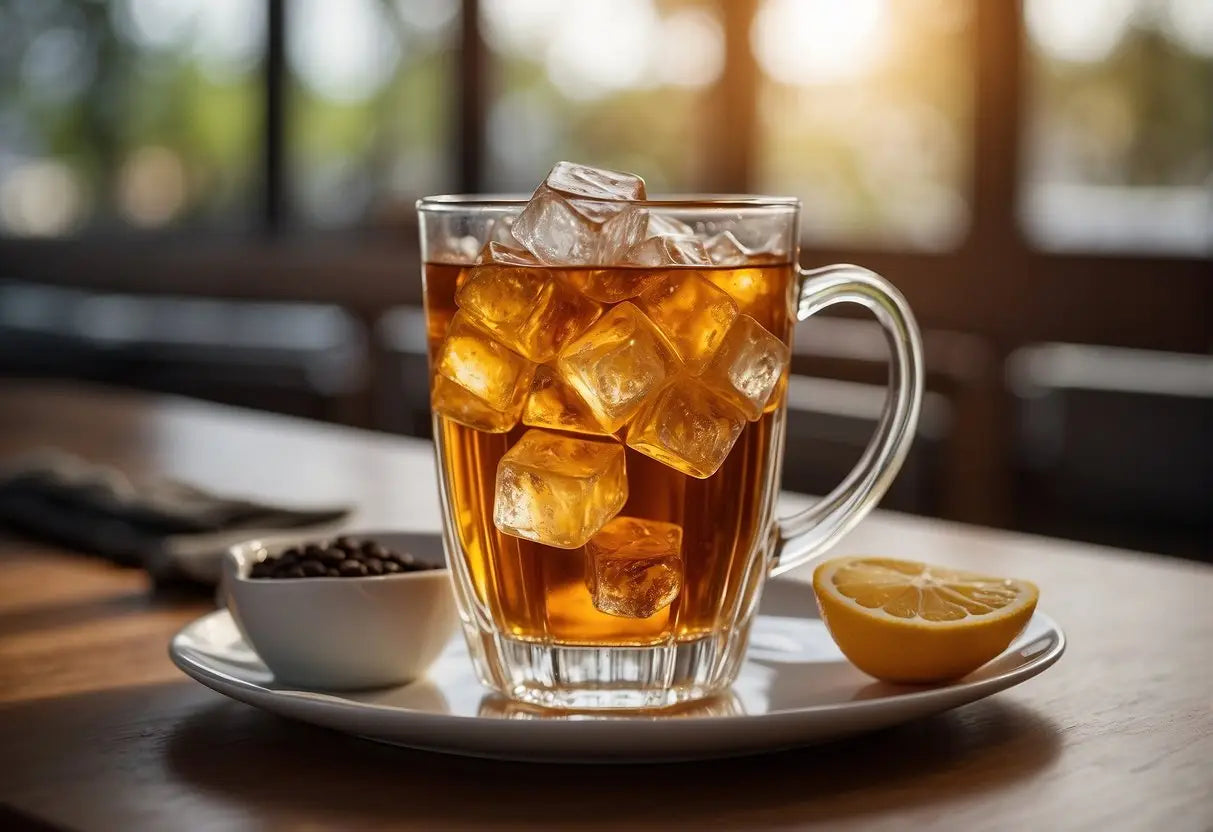
When you consume sweet tea, you ingest caffeine, a natural stimulant found in tea leaves. Your average 8-ounce serving of sweet tea contains about 14 to 70 milligrams of caffeine, depending on the tea's strength and brewing time.
Caffeine affects your central nervous system and can lead to a temporary increase in alertness and energy levels. However, sensitivity to caffeine varies by individual and can cause different reactions. Here are some potential health implications for you to consider:
-
Sleep Disruption: Consuming sweet tea, especially later in the day, may interfere with your sleep patterns, potentially leading to insomnia.
-
Cardiovascular Effects: Caffeine can cause a short-term increase in heart rate and blood pressure; those with certain heart conditions should moderate their intake.
-
Anxiety: You might experience heightened anxiety or jitteriness with excessive caffeine consumption from sweet tea.
-
Digestive Issues: Caffeine stimulates your digestive system, which might lead to gastrointestinal discomfort for some people.
-
Dependency: Regular intake can lead to caffeine dependence, leading to withdrawal symptoms such as headaches and irritability if you suddenly stop consumption.
Moderation is key in avoiding adverse health effects. The FDA recommends a daily caffeine intake of no more than 400 milligrams for most adults, equating to roughly 5 to 28 cups of sweet tea.
| Consideration | Suggestion for Management |
|---|---|
| Sleep | Avoid sweet tea close to bedtime. |
| Heart Rate and Blood Pressure | Monitor intake if you have cardiovascular concerns. |
| Anxiety and Jitteriness | Reduce consumption if symptoms occur. |
| Digestive Comfort | Limit intake if gastrointestinal discomfort arises. |
| Dependency | Be consistent with your daily caffeine consumption. |
It's important to be aware of these health implications to enjoy sweet tea without unwanted effects. Regular health checks and being aware of your body's reactions to caffeine will help you manage your sweet tea consumption responsibly.
Brewing Time and Its Impact on Caffeine Content
When you steep tea, the amount of time it remains in contact with hot water directly influences the caffeine extracted from the leaves. Shorter brewing times result in less caffeine in your sweet tea. Typically, steeping tea for 1-3 minutes leads to a moderately caffeinated beverage, while extending the time up to 5 minutes significantly increases caffeine content.
| Steeping Time | Average Caffeine Content |
|---|---|
| 1-3 minutes | Moderate |
| 3-5 minutes | High |
It is important for you to note that the type of tea leaves used also affects caffeine levels, with black tea generally containing more caffeine than green tea. Sweet tea, often made from black tea leaves, follows the same caffeine extraction principles.
When brewing your own sweet tea, you’ll find that a standard 8 oz serving steeped for 3 minutes contains approximately 30-50 mg of caffeine. Increasing the brewing time to 5 minutes can raise the caffeine content to around 40-70 mg.
Keep in mind that these figures are approximate. The precise caffeine content can vary based on additional factors like the tea leaf variety, water temperature, and the amount of tea used. To control your caffeine intake through sweet tea, adjust your brewing time accordingly, always keeping these factors in consideration.
Caffeine Content Variation in Homemade Sweet Tea
When you make sweet tea at home, the caffeine content can vary significantly. This variation depends on several factors: the type of tea leaves used, the amount of tea leaves per cup, steeping time, and the water temperature. Typically, black tea leaves, common in sweet tea recipes, contain about 14-70 mg of caffeine per 8 oz serving.
Tea leaf type: Assam or Ceylon black teas are popular choices and have different caffeine levels.
- Assam: 60-90 mg of caffeine per 8 oz
- Ceylon: 50-60 mg of caffeine per 8 oz
Tea leaf amount: More leaves equate to more caffeine.
- Standard: 1 teaspoon of loose leaf tea or 1 tea bag per cup
- Strong: 2 teaspoons of loose leaf tea or 2 tea bags per cup
Steep time: Longer steep times extract more caffeine.
- Short (1-2 minutes): Less caffeine, potentially half the amount of a 3-5 minute steep
- Long (3-5 minutes): More caffeine, as this is the usual recommended time for a full-flavor brew
Water temperature: Higher temperatures extract caffeine more efficiently.
- Boiling (212°F): Max caffeine extraction
- Below boiling (~200°F): Less caffeine extraction
Utilize a thermometer and timer to keep these variables consistent for your desired caffeine level. Keep in mind that adding more sugar or sweeteners does not affect the caffeine content. Here's a simplified reference:
| Factor | Less Caffeine | More Caffeine |
|---|---|---|
| Tea Leaf Type | Lower-caffeine varieties | Assam, Ceylon |
| Tea Leaf Amount | 1 tsp/1 bag | 2+ tsp/2+ bags |
| Steep Time | 1-2 minutes | 3-5 minutes |
| Water Temperature | Below boiling | Boiling |
Remember, individual sensitivity to caffeine varies, so adjust your brewing methods according to your own preferences and caffeine tolerance.
Decaffeinated Sweet Tea Options
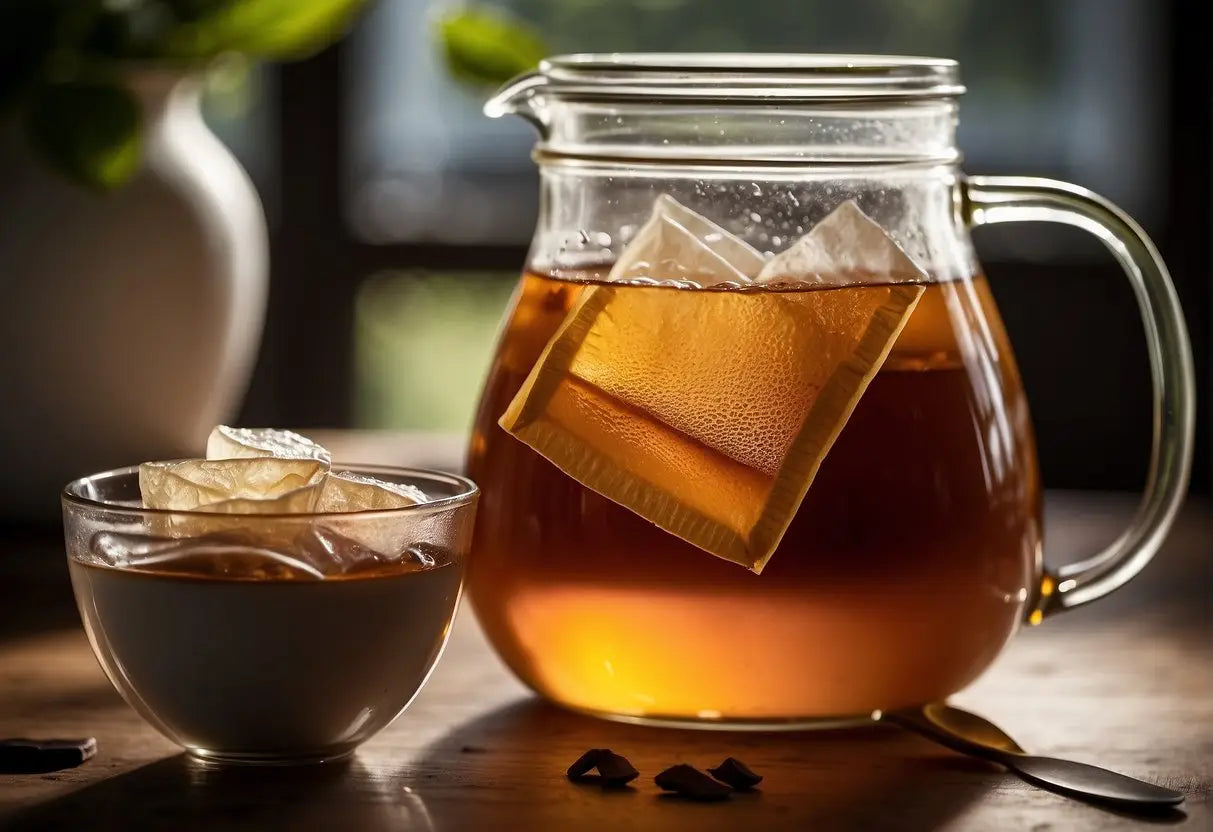
When looking for decaffeinated sweet tea, you have various options. Decaffeinated tea is made by removing most of the caffeine from the leaves, offering you a beverage with significantly lower caffeine levels.
Commercially Prepared Decaf Sweet Tea: Many brands offer bottled decaf sweet tea, which is a convenient choice if you prefer ready-to-drink options. Check labels for caffeine content, as some may still contain trace amounts.
Loose-Leaf Decaf Sweet Tea:
- Process: Loose-leaf teas are decaffeinated using methods like CO2, ethyl acetate, or water processing.
- Flavor: Choose from classic black tea or explore other types like rooibos, which is naturally caffeine-free.
Decaf Tea Bags: If you brew your sweet tea at home, you can buy decaffeinated tea bags. They offer similar flavor profiles to their caffeinated counterparts and can be sweetened to your liking.
Brew Your Own with Decaf Tea:
- Boil water and let it cool for about a minute.
- Steep the decaffeinated tea bag for 3-5 minutes.
- Dissolve your preferred sweetener while the tea is warm.
- Chill and serve with ice.
For a caffeine-free alternative, consider herbal teas like chamomile or peppermint, which naturally contain no caffeine and provide a different taste experience while still satisfying that sweet tea craving. Remember to read the packaging to ensure that the tea is truly decaffeinated and not just lower in caffeine.
How to Estimate Caffeine Intake from Sweet Tea
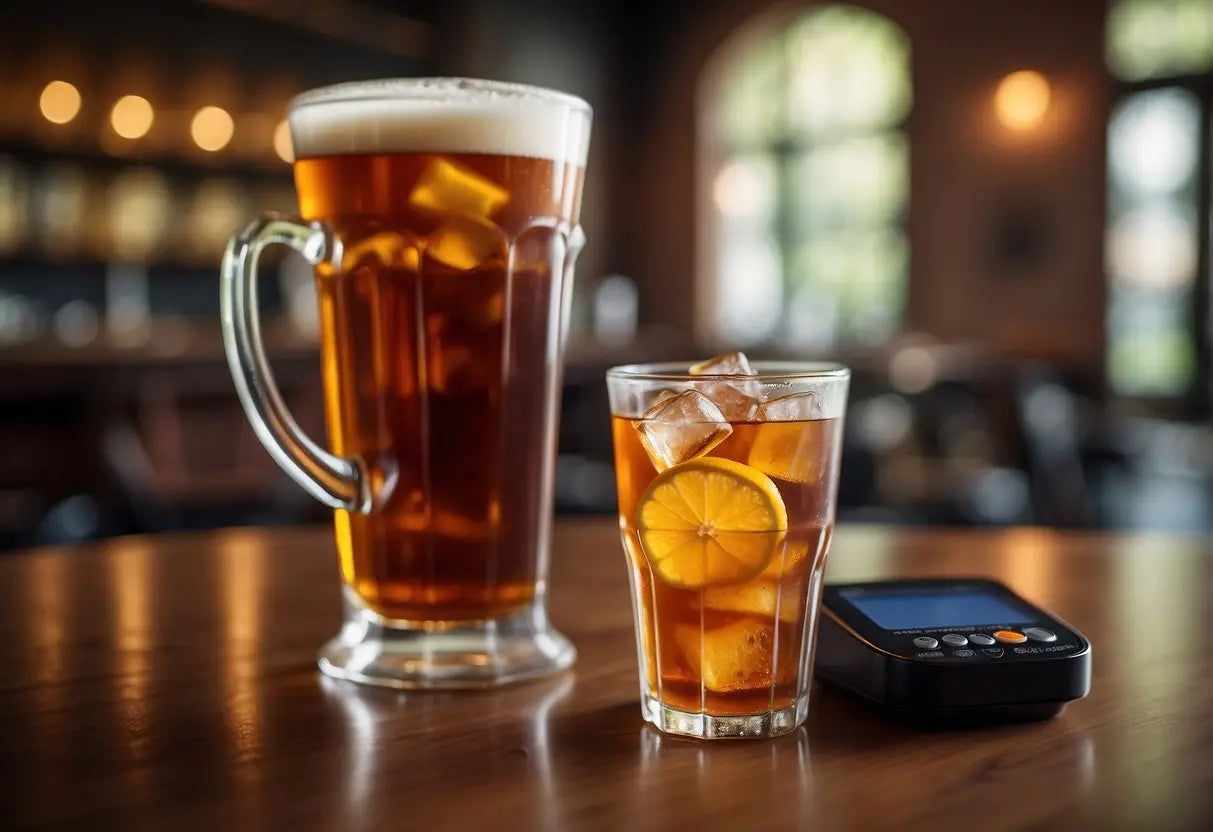
To accurately estimate your caffeine intake from sweet tea, you must consider several factors including the type of tea leaves used and the brewing time.
Tea Type and Caffeine Content:
- Black Tea: Typically contains about 47 milligrams of caffeine per 8 oz.
- Green Tea: Approximately 28 milligrams of caffeine per 8 oz.
Brewing Time:
- Shorter brewing time (1-3 minutes): Yields less caffeine.
- Longer brewing time (3-5 minutes): Increases caffeine content.
Calculate your caffeine intake by noting the volume of sweet tea consumed and adjusting for the specific tea type and brewing time. For instance:
- 8 oz of sweet tea made with black tea leaves brewed for 3 minutes is close to 47 milligrams of caffeine.
For accuracy:
- Measure the amount of tea (in ounces) you drink.
- Identify the type of tea used in your sweet tea.
- Know how long the tea was brewed.
Remember that sweet tea combinations and pre-made commercial products can vary in caffeine content. Consult the packaging or the manufacturer for precise caffeine details if not brewing the tea yourself.
Regulations and Guidelines for Caffeine
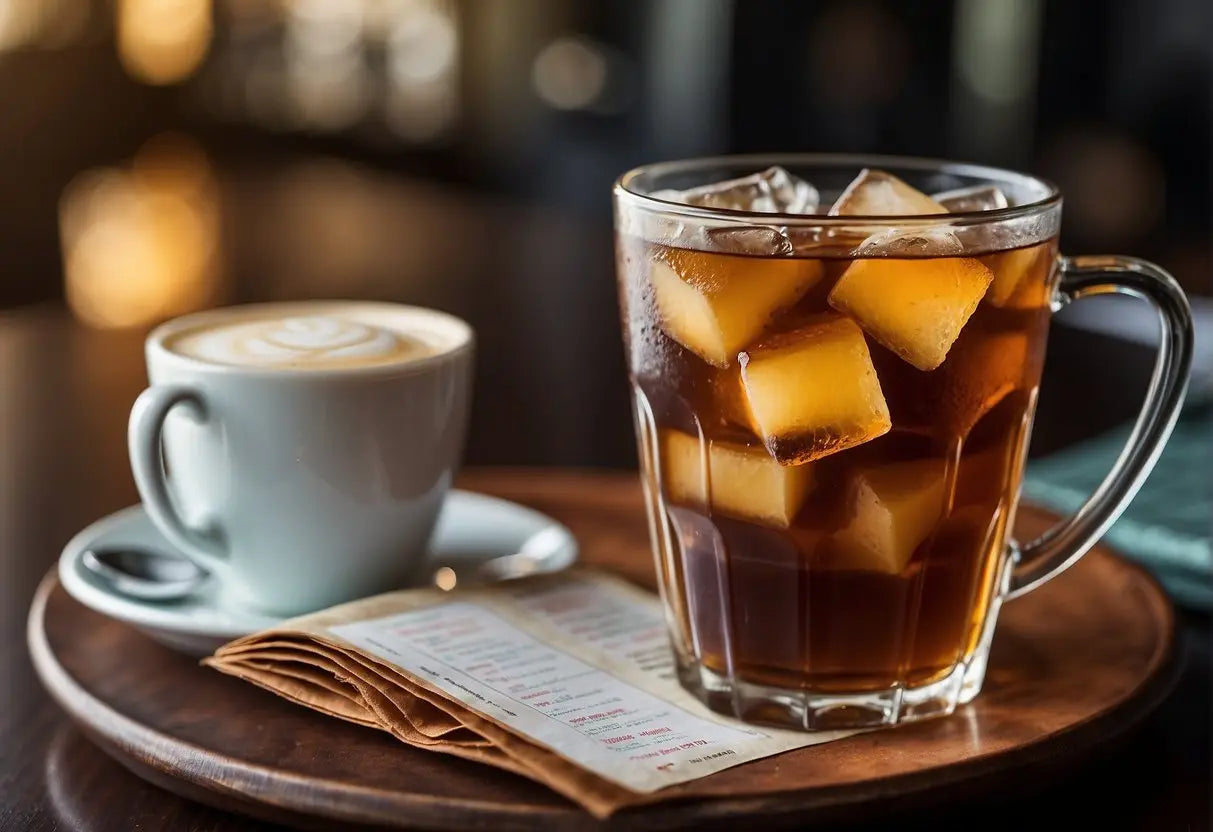
When consuming caffeinated beverages such as sweet tea, you should be aware of the regulatory guidelines that pertain to caffeine intake. Various health organizations have provided recommendations to help you gauge safe consumption levels.
U.S. Food and Drug Administration (FDA):
-
The FDA suggests that adults should limit their caffeine consumption to 400 milligrams per day, which is roughly the amount in four or five cups of coffee. This equates to more than what is typically found in sweet tea, but it's crucial to account for all sources of caffeine throughout the day.
-
Pregnant Women: The FDA advises reducing caffeine intake to 200 milligrams daily.
European Food Safety Authority (EFSA):
-
The EFSA's recommendation aligns with the FDA's, suggesting an upper limit of 400 milligrams of caffeine per day for non-pregnant adults.
-
For pregnant or breastfeeding women, the recommendation is to consume no more than 200 milligrams of caffeine per day.
Health Canada:
-
Similarly, Health Canada recommends an upper limit of 400 milligrams per day for the general adult population.
-
Different guidelines are provided for children, where it's recommended that those between 4 to 6 years old should not consume more than 45 milligrams of caffeine a day.
Following these guidelines helps you to manage and monitor your caffeine intake, ensuring it stays within safe levels. Remember, the caffeine content in sweet tea can vary based on how it's brewed and the type of tea used, so always check the label or ask the manufacturer for specific caffeine content if you're unsure.
Frequently Asked Questions
When exploring the caffeine content in sweet tea, understanding how it compares with other beverages is essential. These FAQs will give you precise insights into the caffeine levels in sweet tea relative to regular tea, coffee, iced tea, popular brands, and soft drinks.
What is the caffeine content comparison between sweet tea and regular tea?
A standard 8-ounce (240-milliliter) serving of sweet tea tends to contain the same amount of caffeine as regular tea, generally between 14 to 70 mg—depending on the type of tea leaves used and the brewing time.
Can you compare the amount of caffeine in sweet tea with that found in a typical cup of coffee?
A typical 8-ounce (240-milliliter) cup of coffee has about 95 mg of caffeine, which is significantly more than the caffeine found in an equivalent serving of sweet tea.
In terms of caffeine levels, how does sweet tea stack up against iced tea?
Sweet tea and iced tea generally have comparable caffeine contents if they're made from the same type of tea leaves and steeped for the same duration. The main difference is the added sugar in sweet tea.
How much caffeine can one expect to find in a standard serving of Chick-fil-A's sweet tea?
Chick-fil-A's sweet tea contains about 35 mg of caffeine per 8-ounce (240-milliliter) serving. Keep in mind that serving sizes typically sold are larger and will contain more caffeine.
What is the difference in caffeine content between Coke and sweet tea?
A 12-ounce (355-milliliter) can of Coca-Cola typically contains about 34 mg of caffeine, which is comparable to an 8-ounce serving of sweet tea, though sweet tea may have slightly more caffeine depending on the brew.
Does Milo's brand sweet tea contain caffeine, and if so, how much?
Milo's sweet tea does contain caffeine. An 8-ounce serving contains about 25 mg of caffeine. Since Milo's is commonly sold in larger quantities, the caffeine content will be higher in the larger servings you might consume.
← Older post Newer post →











